An offshore oil leak has injured marine wildlife and closed beaches in one of the worst oil spills in the country’s history. Authorities say it could take months or years to clean up.
Late last week, a 17-metre-long fin whale and other sea creatures washed up on the shore in southern Israel. Although the cause of the whale’s death is being investigated, the environmental protection minister said it could be attributed to an oil spill from a nearby ship.
The Nature and Parks Authority said on Sunday that an autopsy had found oil-based material in the whale's body, with further tests pending. (Reuters)
“This is a hazard of a magnitude we have not seen in years. We are doing everything in order to find those responsible for the destruction, and are preparing for the difficult and long task of rehabilitating the beaches and preventing further injury to animals,” minister Gila Gamliel said.
“Dozens to hundreds” of tonnes of tar have stained nearly 160 kilometres of coastline, stretching from Haifa in the north, down to Ashkelon near Gaza in the south.
“This is a hazard of a magnitude we have not seen in years. We are doing everything in order to find those responsible for the destruction, and are preparing for the difficult and long task of rehabilitating the beaches and preventing further injury to animals,” minister Gila Gamliel said.
“Dozens to hundreds” of tonnes of tar have stained nearly 160 kilometres of coastline, stretching from Haifa in the north, down to Ashkelon near Gaza in the south.
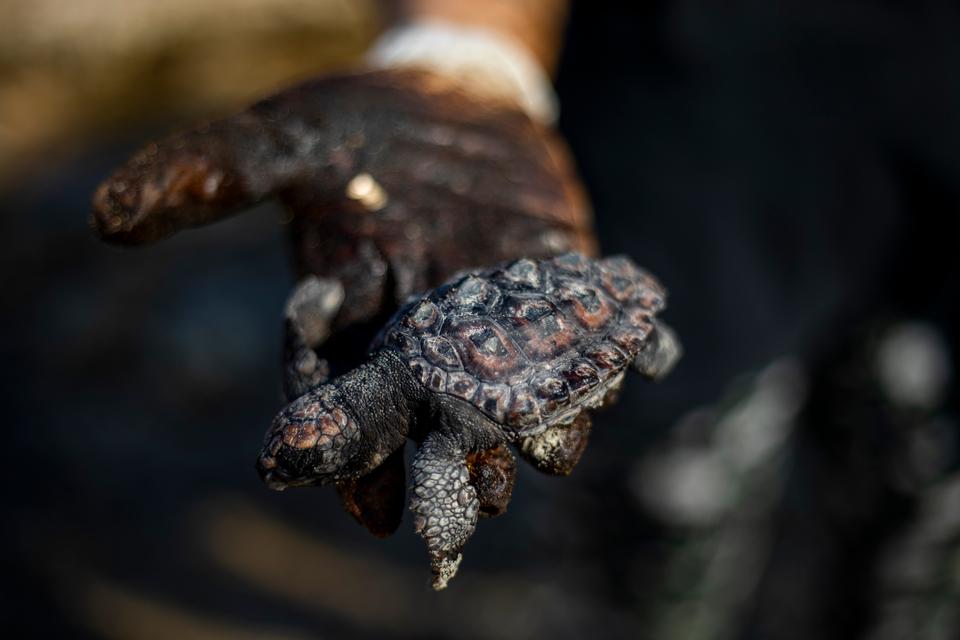
A woman holds a dead sea turtle covered in tar from an oil spill in the Mediterranean Sea in Gador nature reserve near Hadera, Israel, Saturday, Feb. 20, 2021. Hundreds of volunteers are taking part in a cleanup operation of Israeli shoreline as investigations are underway to determine the cause of an oil spill that threatens the beach and wildlife, at Gador Nature Reserve near the northern city of Hadera, the tar smeared fish, turtles, and other sea creatures. (AP)
European and Israeli agencies are searching for a possible source using satellite images and wave movement models.
It is thought to be an oil spill on February 11 from a ship passing about 50 kilometres from the shore. There were nine ships in that area at the time, which are being investigated.
If the ship is found, Israel could take legal action, which could see millions of dollars in compensation for the ecological damage.
By Monday, the sticky black deposits that showed up on Israeli beaches were also visible on beaches in a nature reserve in Tyre, south Lebanon.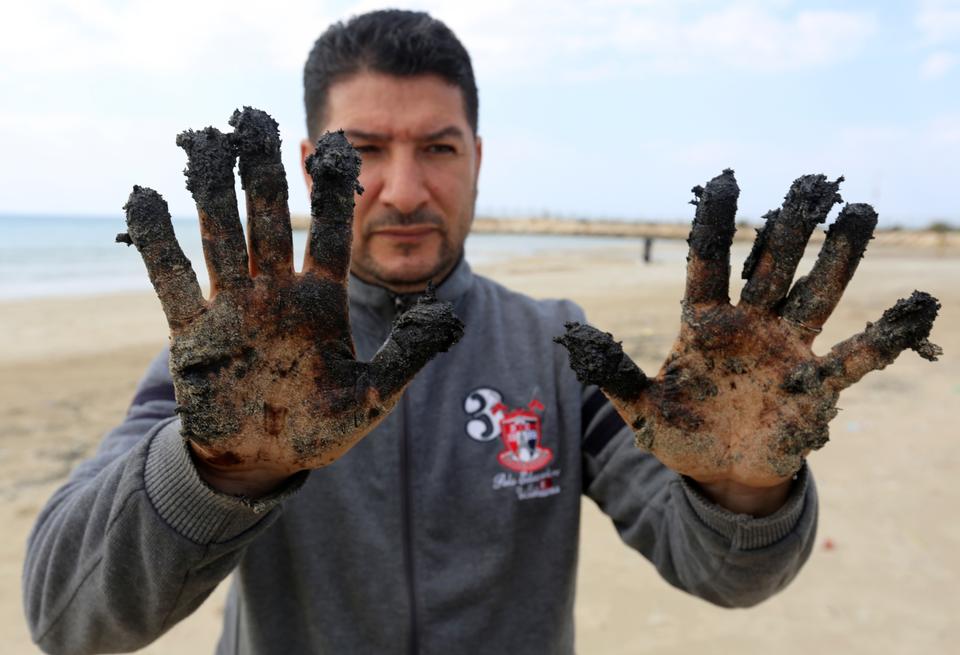
European and Israeli agencies are searching for a possible source using satellite images and wave movement models.
It is thought to be an oil spill on February 11 from a ship passing about 50 kilometres from the shore. There were nine ships in that area at the time, which are being investigated.
If the ship is found, Israel could take legal action, which could see millions of dollars in compensation for the ecological damage.
By Monday, the sticky black deposits that showed up on Israeli beaches were also visible on beaches in a nature reserve in Tyre, south Lebanon.
A man shows tar on his hands in the aftermath of an oil spill on the Mediterranean coast that also reached the Tyre nature reserve in Lebanon. (Reuters)
Thousands of volunteers have gathered to help clean globs of sticky tar from the beaches. They are also helping clean turtles, fish, and birds covered in the substance as well as wildlife that may have ingested oil.
Several volunteers were reported to have been hospitalised after inhaling the fumes.
Thousands of volunteers have gathered to help clean globs of sticky tar from the beaches. They are also helping clean turtles, fish, and birds covered in the substance as well as wildlife that may have ingested oil.
Several volunteers were reported to have been hospitalised after inhaling the fumes.
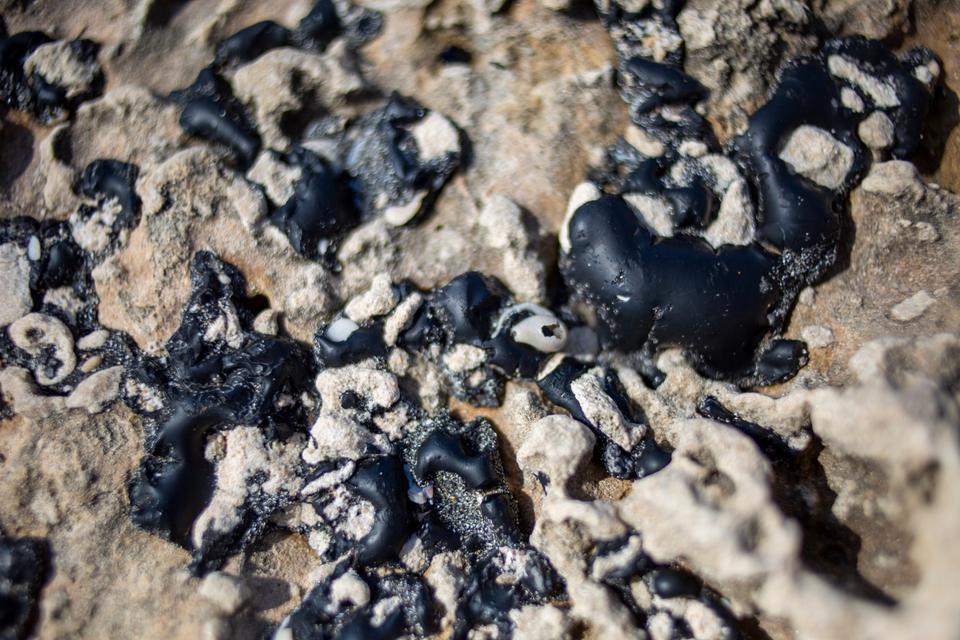
Tar pieces from an oil spill stuck on rocks in the Mediterranean sea as it reached Gador nature reserve. (AP)
Experts are calling it the “worst beach contamination” in Israel’s history.
"We need to look to the future -- this event and similar ones around the world show us how crucial it is to wean ourselves from these polluting fuels, and shift to renewable energy," Gamliel said.
Experts are calling it the “worst beach contamination” in Israel’s history.
"We need to look to the future -- this event and similar ones around the world show us how crucial it is to wean ourselves from these polluting fuels, and shift to renewable energy," Gamliel said.
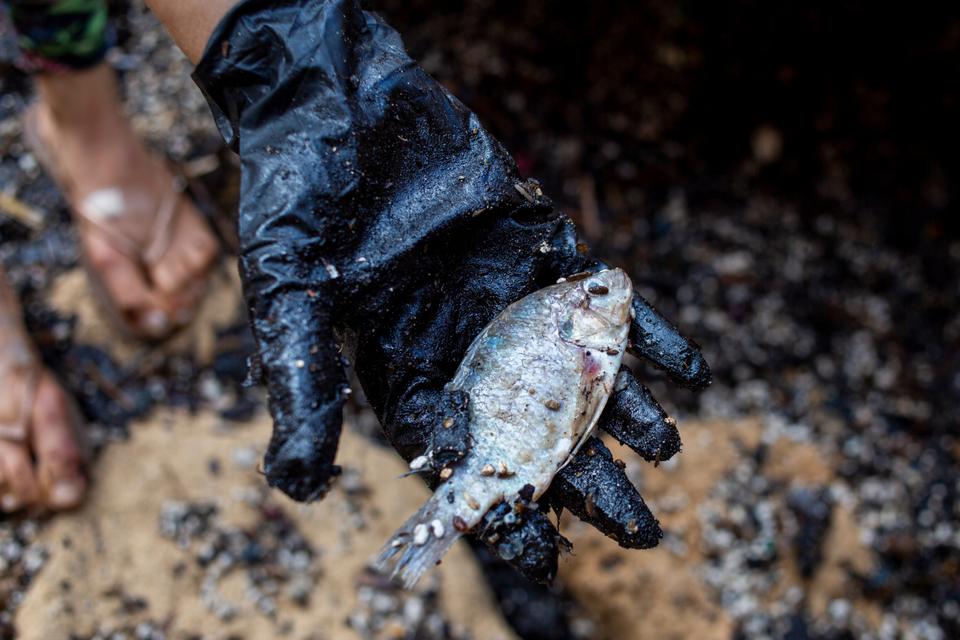
A woman holds a dead fish after she cleaned it from tar. (AP)
The spill is “a promo for a catastrophe that could be 250 times as bad” if a joint Israeli-UAE pipeline deal is not stopped, Rachel Azaria, chair of Life and Environment, an umbrella organization for environmental groups in Israel told the Times of Israel.
The agreement to bring Emirati crude oil by tanker to a pipeline in the Red Sea port of Eilat was signed after the UAE normalised ties with Israel late last year.
In October, after normalisation, Israel’s state-owned Europe-Asia Pipeline Company (EAPC) announced a "binding MoU" with MED-RED Land Bridge Ltd - a joint venture between Abu Dhabi's National Holding company and several Israeli firms - to bring crude oil from UAE to Eilat and then transport it by pipeline to Israel's Mediterranean city of Ashkelon for onward export to Europe.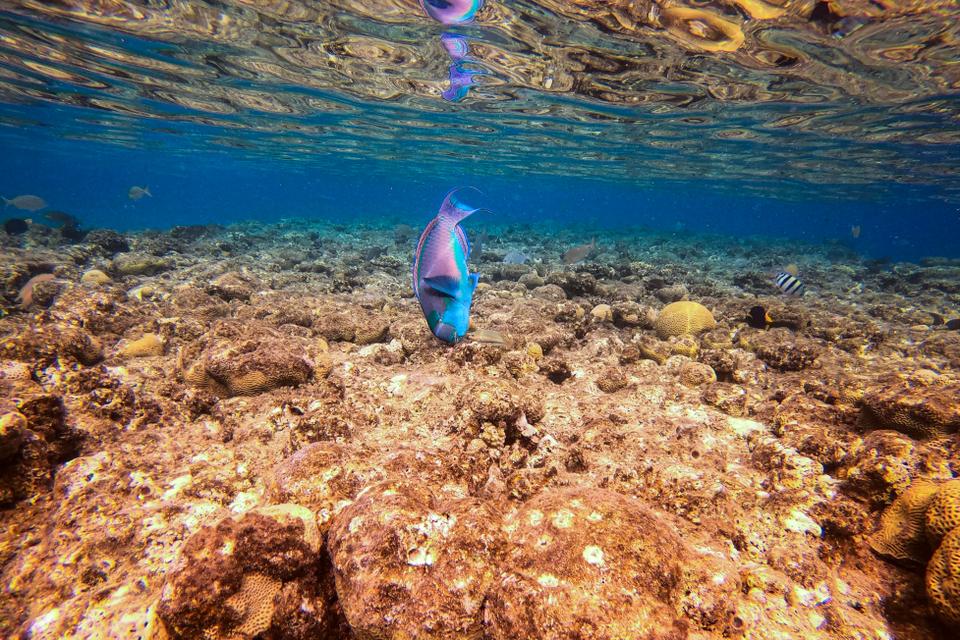
The spill is “a promo for a catastrophe that could be 250 times as bad” if a joint Israeli-UAE pipeline deal is not stopped, Rachel Azaria, chair of Life and Environment, an umbrella organization for environmental groups in Israel told the Times of Israel.
The agreement to bring Emirati crude oil by tanker to a pipeline in the Red Sea port of Eilat was signed after the UAE normalised ties with Israel late last year.
In October, after normalisation, Israel’s state-owned Europe-Asia Pipeline Company (EAPC) announced a "binding MoU" with MED-RED Land Bridge Ltd - a joint venture between Abu Dhabi's National Holding company and several Israeli firms - to bring crude oil from UAE to Eilat and then transport it by pipeline to Israel's Mediterranean city of Ashkelon for onward export to Europe.

While coral populations around the world are under threat from bleaching caused by climate change, the reefs in Eilat have remained stable due to their unique heat resistance. (AFP)
Israeli environmentalists have warned that the deal threatens unique Red Sea coral reefs and could lead to "the next ecological disaster".
Professor of marine biology at Ben Gurion University, Nadav Shashar, said that the infrastructure is not set up to prevent accidents and only designed "to treat pollution once it's already in the water.”
With the increase of shipments, "the result will be a constant leak of oil pollution," he said.
Israeli environmentalists have warned that the deal threatens unique Red Sea coral reefs and could lead to "the next ecological disaster".
Professor of marine biology at Ben Gurion University, Nadav Shashar, said that the infrastructure is not set up to prevent accidents and only designed "to treat pollution once it's already in the water.”
With the increase of shipments, "the result will be a constant leak of oil pollution," he said.








